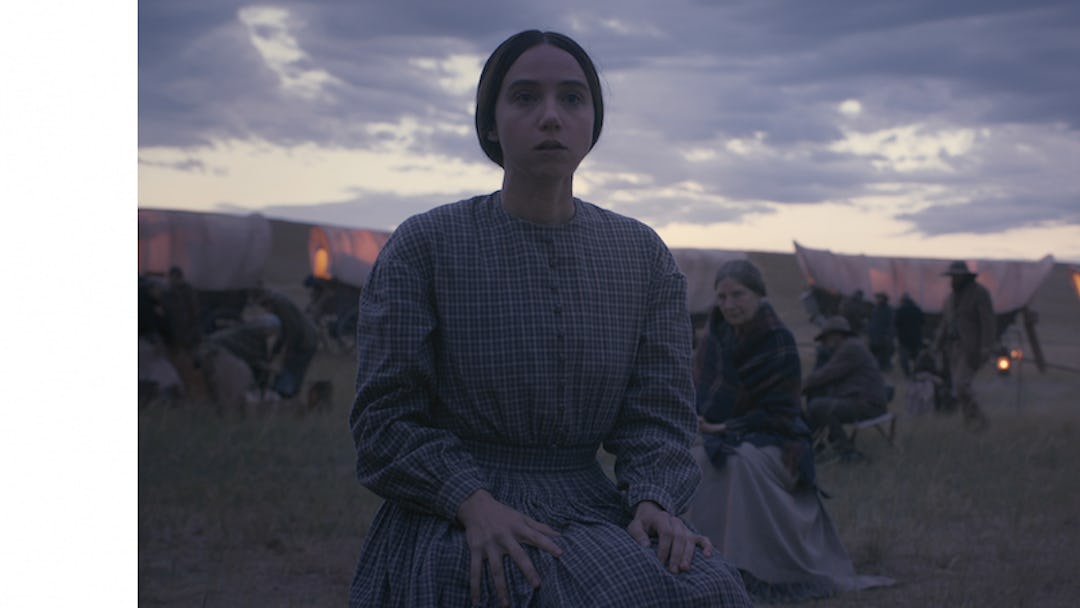Joel and Ethan Coen’s new film The Ballad of Buster Scruggs is a Netflix release, originally (and they say erroneously) reported as a television series. But it’s easy to understand the confusion; it’s an anthology film, the first they’ve ever made, six stories of varying length and tone, bound only by the shared setting of the American West. And I do mean “bound”; the first images are close-ups of the book that supposedly contains them, a well-worn volume with the full title The Ballad of Buster Scruggs — and Other Tales of the American Frontier — with Color Plates, and they go back to that book as a bridging device, filling the frame with color illustrations and snatches of text. It’s a rich literary tradition, spanning from early practitioners like Owen Wister and Zane Grey to more modern wordsmiths like Elmore Leonard and Charles Portis, whom the Coens previously adapted for 2010’s True Grit, and who clearly shares their love for florid language (it’s full of ornate dialogue like “There’ll be customers there amenable to drawin’ up in a circle ‘round a deck o’ cards”).
The first section is the title story, starring O Brother, Where Art Thou’s Tim Blake Nelson as a cheerfully murderous singing cowboy, who confidently, conspiratorially addresses the camera as he makes waste of anybody who looks at him sideways. The central conceit here is one of incongruity, of Gene Autry type fused with the trigger-happy gore of late Peckinpah; it’s also the most typically Coen-esque of the films, with musical numbers in the style of O Brother and their recent Hail, Caesar!, paired with the pitch-black gunshot comedy of The Ladykillers and Burn After Reading. In other words, they’re easing us in, and getting some big laughs along the way.
(Netflix)
Next comes “Near Algodones,” with James Franco as a bank robber on a streak of very bad luck, beginning with his encounter with a chatty, wall-eyed bank teller (the great Stephen Root) who proves himself a more formidable foe than anticipated. Sometimes the Coens land on an image so juicy you half-wonder if the whole film was created to get them there; there’s an image like that here, of Franco’s outlaw abandoned mid-hanging, atop his horse with a rope around his neck, as the animal slooooowly eats the grass on the ground, moving farther and father from the tree, leaving less and less slack.
That story’s also mostly comic in nature — both are really just extended jokes — so the tonal shift of the third section, “Meal Ticket,” may catch some viewers unawares. Liam Neeson stars as the caretaker of “Professor Harrison” (Harry Melling, from the Harry Potter movies), an orator/entertainer with neither arms nor legs. They wordlessly go about their repetitive routine, moving from one encampment to another, as Harrison performs his dramatic readings for dwindling crowds. It’s awfully melancholy, a portrait of monotony and misery with no clear escape until the caretaker spots a hot new act: a performing chicken that does math problems.
A wonderfully crusty Tom Waits does a solo turn in the fourth story, “All Gold Canyon,” as a prospector who finally strikes gold and — well, the pleasure of this one comes from how patiently the Coens deliver its payoffs and punchlines, and how the subtext of much of the film to date (the stark cruelty of this era) becomes text. Oh, and Waits delivers a running to-himself commentary that legitimately recalls W.C. Fields; your mileage may vary, but this viewer’s favorite line is probably “How high can a bird count, anyway?”
(Netflix)
Story number five, “The Gal Who Got Rattled,” stars the marvelous Zoe Kazan as a nervous young woman traveling west in a wagon train with her brother, who quickly dies and leaves her, much to her terror, to fend for herself. Bill Heck matches up nicely as the wagon master who takes a shine to her; they develop a sweet, easy chemistry, and the entire section has a genuine kindness that’s not quite like anything the Coens have tried before, aside from those short scenes between Margie and Norm in Fargo. And the final section, “The Mortal Remains” is better experienced than described, taking the old standby of five strangers in a stagecoach and just sort of willing it into something supernatural.
The Ballad of Buster Scruggs runs a hefty 135 minutes, but it moves like a runaway mule — again, probably because it shifts tempos so often, veering from broad comedy to melancholic tragedy, and points in between. And though it sounds like a strange adjective for a lengthy picture, its most admirable quality may be its discipline; several of these stories are such clever ideas, with so many unexplored possibilities, that it must’ve been tempting to spin them off into features of their own. Instead, they’re contained and condensed for maximum effect, and the resulting multi-faceted effort is an investigation of ideas and narrative gimmicks that might not’ve sustained their own exploration.
As with any anthology film, consensus favorites may vary; mine is probably “The Gal Who Got Rattled.” But something about “Meal Ticket” won’t leave my head. It is, on reflection, a story about a kind of sophisticated, intellectual entertainment that has fallen out of favor, and the goofy sideshow that taken its place in the public imagination. Perhaps the Coens didn’t mean to craft a metaphor for theatrical movie-going and at-home binge-watching, though little they do seems accidental. Suffice it to say that were it intentional, I’m glad the problem-solving chicken paid them enough money to craft something this wild and alive.
The Ballad of Buster Scruggs is now playing in limited release; it expands wider, and streams on Netflix, on Friday.
